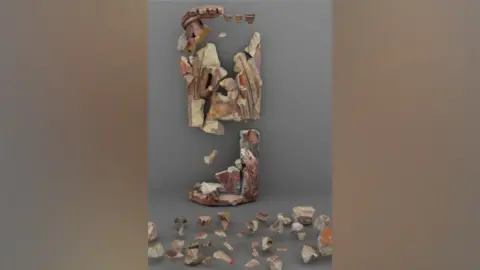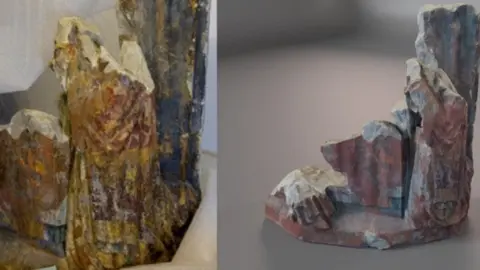'Last in England' smashed medieval statue recreated
 Adam Redford
Adam RedfordA 15th Century statue that was found smashed into 170 fragments behind a church wall has been painstakingly pieced together using computer animation.
The painted statue of The Mass of St Gregory was found during restoration work in the 1970s, behind a wall at St Peter's Church in Shaftesbury.
Dorset County Museum teamed up with Bournemouth University to restore the statue - thought to be the last of its kind in England - digitally after fitting the fragments back together by hand proved too challenging.
It took several months for Adam Redford and Martin Smith at Bournemouth University to recreate it using visual effects software and thousands of images of the fragments.
 Claire Ryland/Adam Redford
Claire Ryland/Adam RedfordDorset Museum said it was thought to have been "smashed to smithereens and hidden by parishioners" behind a wall at the time of the Reformation - a religious movement which challenged the teachings of the Roman Catholic Church.
Claire Ryley, from the museum in Dorchester, said putting the statue back together digitally had been possible after the museum secured a grant to fund the project.
She said the complete statue would have stood about 6ft (1.8m) high and was "thought to be the only one of its kind in England".
"A lot of pieces are really heavy and fragile - working with Bournemouth University is a marvellous opportunity to look at the pieces safety without lifting them," Ms Riley continued.
"This has been an intriguing but also a very rewarding jigsaw puzzle."
The largest statue pieces are on show at the museum along with the digital reconstruction.
Another 50 pieces are set to be made into 3D images for visitors to try and work out where they go, via a touch screen.
You can follow BBC Dorset on Facebook, X (Twitter), or Instagram.
